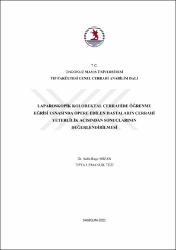Laparoskopik kolorektal cerrahide öğrenme eğrisi esnasında opere edilen hastaların cerrahi yeterlilik açısından sonuçlarının değerlendirilmesi
Künye
Mizan, S.R. (2021). Laparoskopik kolorektal cerrahide öğrenme eğrisi esnasında opere edilen hastaların cerrahi yeterlilik açısından sonuçlarının değerlendirilmesi. (Uzmanlık tezi). Ondokuz Mayıs Üniversitesi, Samsun.Özet
GİRİŞ: İlk laparoskopik kolektomi, kolonun anatomik ve fizyolojik zorlukları nedeniyle ilk kolesistektomiden 5 yıl sonra uygulandı. İlk laparoskopik kolon rezeksiyonunun yapılışından yaklaşık 31 yıl geçmiş olmasına, artan teknik ve teknolojik gelişmelere rağmen laparoskopik kolorektal cerrahi kolorektal hastalalıkları tedavisinde altın standart olmaktan henüz uzaktadır. Pek çok cerrahın kolorektal hastalıklarda laparoskopik girişimleri tercih etmemesinin en büyük etkeni uzun ve zahmetli öğrenme eğrisi ve öğrenme eğrisi esnasında opere ettiği hastaların onkolojik başarılarının düşük olması endişesidir. AMAÇ: Laparoskopik kolorektal cerrahinin güvenirliği tüm dünyada tartışma konusudur. Özellikle cerrahın öğrenme eğrisi içerisindeki vakalarının onkolojik prensiplere göre yeterliliğini değerlendiren çok sayıda çalışma mevcuttur. Bu çalışmada Ondokuz Mayıs Üniversitesi Tıp Fakültesi'nde aynı cerrahın yapmış olduğu kolorektal cerrahi sonuçlarının değerlendirilmesi amaçlanmıştır. HASTALAR VE YÖNTEM: Hastanemizde Ocak 2018'den Kasım 2020'ye kadar hastanemizde aynı hekim tarafından laparoskopik kolorektal cerrahi uygulanan hastaların geçmişe yönelik dosyaları hastanemiz nucleus sisteminden, direkt dosyaları incelenerek ve eksik bilgiler hastalar ve yakınlarıyla görüşülerek çalışmaya katılmıştır. BULGULAR Ocak 2018 – Kasım 2020 arasında kolorektal hastalıklar nedeniyle 78 hastaya aynı hekim tarafından laparoskopik kolorektal cerrahi uygulandı. Bu hastaların 50'si erkek 28'i kadın idi. Hastaların yaş ortalaması 62,6 (12,6) idi. Çalışmamızdaki laparoskopik kolorektal cerrahi uygulanan hastaların intraoperatif komplikasyon oranı %3, açığa dönme oranı %5, postoperatif komplikasyon oranı %17 idi. Spesmenlerin histopatolojik olarak incelenmesinde distal cerrahi sınır pozitifliği %4, radial cerrahi sınır pozitifliği %2, çıkarılan lenf nodu sayısı ortalama 20 (12,3), ortanca değeri 19 (4-72) idi. Tüm bu veriler ışığında laparoskopik kolorektal cerrahi prosedürlerinde onkolojik başarı oranımız %82-83 arasındadır. SONUÇ Sonuç olarak öğrenme eğrisi sürecindeki aynı cerrah tarafından kolorektal hastalıklar nedeniyle laparoskopik kolorektal cerrahi uygulanan hastaların onkolojik başarı açısından gözardı edilmediği söylenebilir. ANAHTAR KELİMELER: Laparoskopik kolorektal cerrahi, öğrenme eğrisi, onkolojik başarı. BACKGROUND: The first laparoscopic colectomy was performed in June 1990, 5 years after the first cholecystectomy, due to the anatomical and physiological difficulties of the colon. Despite the fact that it has been nearly 31 years since Jacobs performed the first laparoscopic colon resection and despite the increasing technical and technological developments, laparoscopic colorectal surgery is far from being the gold standard in the treatment of colorectal diseases. The biggest reason why many surgeons do not prefer laparoscopic interventions in colorectal diseases is the long and demanding learning curve and the concern of the low oncological success of the patients who have operated during the learning curve. OBJECTIVE: The reliability of laparoscopic colorectal surgery is a matter of debate around the world. There are many studies evaluating the adequacy of the cases in the learning curve of the surgeon according to oncological principles. In this study, it was aimed to evaluate the results of colorectal surgery performed by the same surgeon in Ondokuz Mayıs University Faculty of Medicine. PATIENTS AND METHODS: Retrospective files of patients who underwent laparoscopic colorectal surgery by the same physician in our hospital from January 2018 to November 2020 were included in the study by examining the direct files from our hospital's nucleus system and by interviewing the patients and their relatives with missing information. RESULTS: Between January 2018 and November 2020, 78 patients underwent laparoscopic colorectal surgery by the same physician for colorectal diseases. 50 of these patients were male and 28 of them were female. The mean age of the patients was 62.6 (12.6). In our study, the intraoperative complication rate of patients who underwent laparoscopic colorectal surgery was 3%, the rate of reversion was 5%, and the postoperative complication rate was 17%. In the histopathological examination of the specimens, the distal surgical margin positivity was 4%, the radial surgical margin positivity was 2%, the mean number of lymph nodes removed was 20 (12.3), and the median value was 19 (4-72). In the light of all these data, our oncological success rate in laparoscopic colorectal surgery procedures is between 82-83%. CONCLUSION: As a result, it can be said that patients who underwent laparoscopic colorectal surgery for colorectal diseases by the same surgeon in the learning curve are not ignored in terms of oncological success. KEYWORDS: Laparoscopic colorectal surgery, learning curve, oncological success.
















